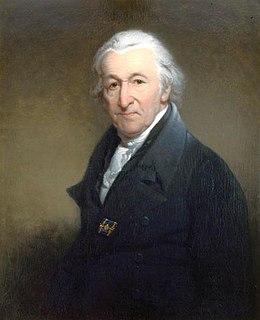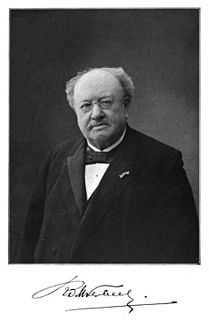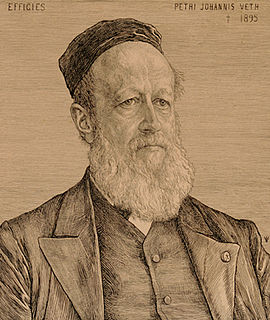Related Research Articles

The Royal Netherlands Academy of Arts and Sciences is an organization dedicated to the advancement of science and literature in the Netherlands. The academy is housed in the Trippenhuis in Amsterdam.

Martin(us) van Marum was a Dutch physician, inventor, scientist and teacher, who studied medicine and philosophy in Groningen. Van Marum introduced modern chemistry in the Netherlands after the theories of Lavoisier, and several scientific applications for general use. He became famous for his demonstrations with instruments, most notable the Large electricity machine, to show statical electricity and chemical experiments while curator for the Teylers Museum.

Rogier Diederik Marius Verbeek was a Dutch geologist and natural scientist.
The Royal Dutch Geographical Society is an organization of geographers and those interested in geography in The Netherlands. It has about 4000 members and sponsors lectures on geography. It publishes a scientific magazine, Tijdschrift voor economische en sociale geografie and Nederlandse Geografische Studies or NGS. It also has a large collection of about 135,000 maps and 4500 atlases which have been housed at a library at the University of Amsterdam since 1880.
A genootschap is a specifically Dutch form of company, association, society or cooperative, named after the pursuit for which its members gather.
The Badaic languages are a group of three closely related Austronesian languages spoken in the North Lore and South Lore districts of Central Sulawesi, Indonesia, viz. Bada (Bada’), Behoa (Besoa), and Napu. The three languages are 80–91% lexically similar and to a great degree mutually intelligible, but their speakers are culturally distinct.
Muller is a restaurant in Groningen, in the Netherlands. It is a fine dining restaurant that is awarded one Michelin star in 1997 and retained that rating until 2012. GaultMillau did not award any points, due to the recent change of course but kept the restaurant in the Guide.
Theodorus Marinus Roest was a Dutch numismatist and conservator of the numismatic collection of the Teylers Museum.
The Huygens-Fokker Foundation is a "centre for microtonal music" founded on February 15, 1960, housed in the Muziekgebouw aan 't IJ, and named for Christiaan Huygens and Adriaan Fokker. The Foundation's library possesses a large archive of correspondence, scores, books, and other publications. The Foundation presents frequent concerts presenting contemporary, early, popular, and improvised microtonal music. They maintain contact with other organizations dedicated to microtonality including Tonalsoft, the Harry Partch Institute, the Logos Foundation, and individuals such as Kyle Gann. They published the journal Thirty-One and presented MicroFest Amsterdam 2011. They house the 31-tone Fokker organ with new MIDI-connections in the BAM Hall. The current director is Sander Germanus.
Hendrik Johannes (Henny) van der Windt is a Dutch associate professor at the Rijksuniversiteit Groningen, specialized in the relationship between sustainability and science, in particular the relationship between nature conservation and ecology and between energy technologies, locale energy-initiatives and the energy transition.
BMGN: Low Countries Historical Review is a peer-reviewed open-access academic journal covering the history of the Low Countries, which is taken to include the Netherlands and Belgium and their colonial and international involvements. It is published by the Royal Netherlands Historical Society, with articles appearing either in Dutch or in English. In June 2018 it was announced that Dirk Jan Wolffram would be taking over as chair of the editorial board.

Pieter Johannes Veth was a Dutch professor of geography and ethnology and the first Chairman of the Royal Netherlands Geographical Society. He was also the father of Daniël David Veth, a Dutch explorer and photographer.
The following is a timeline of the history of the municipality of 's-Hertogenbosch, Netherlands.
The Koninklijk Zeeuwsch Genootschap der Wetenschappen (KZGW) or Royal Zeeland Scientific Society in English, commonly referred to as the "Zeeuwse Genoothschap" is a Dutch scientific society that was founded in 1769 to promote the practice of Arts and Sciences in the province of Zeeland in the Netherlands.

As of 2018, Wolters Kluwer ranks as the Dutch biggest publisher of books in terms of revenue. Other notable Dutch houses include Brill and Elsevier.
Henry I of Nassau, German: Heinrich I. von Nassau, was the first person who named himself count of Nassau.

The Marechaussee Museum or Royal Marechaussee Museum is a museum on the history of the Royal Marechaussee of the Netherlands from its foundation by William I of the Netherlands on 26 October 1814 until the present day. It is based in the former Koninklijk Weeshuis in Buren, originally opened as an orphanage on 26 May 1612 by Maria van Nassau and remaining in that role until 1953.

The Royal Netherlands Institute in Rome, founded in 1904 as Nederlands Historisch Instituut te Rome, is a Dutch centre for studies in the Humanities based in Rome. It was awarded the title "Royal" by Queen Beatrix in 2004. The Institute was initially one of several Roman Historical Institutes set up to identify and publish Roman archival documents of national interest, with Gisbert Brom as its first director. Its remit has since been extended to include the study of archaeology, art history, literature, architecture and geography.
References
- ↑ "Historische samenwerkingsverbanden: Koninklijk Nederlands Historisch Genootschap". Historici.nl. 30 July 2014.